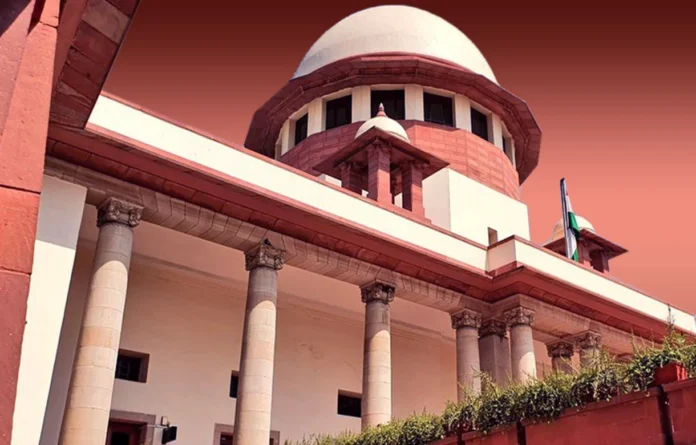In order to streamline urban development and ensure strict enforcement of laws prohibiting illegal or unauthorised construction, the Supreme Court has issued a slew of guidelines for States and Union Territories across the country.
While upholding the demolition of unauthorised commercial constructions at a residential plot in Meerut district of Uttar Pradesh, the Bench of Justice JB Pardiwala and Justice R Mahadevan on Tuesday said that delay in official action against unauthorised constructions could not be used as a shield to protect such illegality in future.
Delay in directing rectification of illegalities, administrative failure, regulatory inefficiency, cost of construction and investment, negligence and laxity on part of the authorities concerned in performing their obligations under the UP Avas Evam Vikas Parishad Adhiniyam could not be used as a shield to defend action taken against illegal constructions, it added.
Issuing the set of guidelines, the Apex Court directed the authorities that before giving a go-ahead to
building planning, they should take an undertaking from the builders that possession of the building would be handed over to the owners only after obtaining completion certificate from the authorities.
The guidelines made it mandatory for the developers or owners to display a copy of the approved plan at the site during the entire period of construction. The authorities were further directed to periodically inspect the premises and maintain an official record of the same.
The authorities were directed to issue completion certificate for a residential or commercial building only after conducting personal inspection of the same, and after being satisfied that the building was constructed in accordance with the building planning permission given and that there was no deviation in such construction in any manner.
The service providers/Board were ordered to provide service connections, such as electricity, water supply and sewerage connection to the buildings only after the production of completion certificate.
The authorities were directed to take immediate action against the builders in case any deviation or violation contrary to the planning permission was found after the issuance of completion certificate.
The Bench further ordered departmental action against any official found guilty of issuing wrongful occupation certificate.
The measures suggested the local bodies, States and Union Territories not to give licence for the conduct of any business or trade in any unauthorised building, irrespective of it being residential or commercial.
The development must be in conformity with the zonal plan and usage. Any modification to such zonal plan and usage must be taken by strictly following the rules in place and in consideration of the larger public interest and the impact on the environment, the guidelines pointed out.
The Supreme Court said that in case a department sought assistance of another department or authority to take action against any unauthorised construction, the latter should render immediate assistance and co-operation.
Warning that any dereliction would be viewed seriously, the top court of the country directed the States/UTs to take disciplinary action against the erring officials, once the matter was brought to their knowledge.
The guidelines directed Banks and financial institutions to sanction loan against any building as security only after verifying the occupation certificate issued to the building.
The Bench warned that violation of any of the directions would lead to initiation of contempt proceedings, in addition to prosecution under the respective laws.
Emphasising on strict adherence to urban planning laws and accountability of officials, the Apex Court said that it cannot encourage constructions put up in violation of a building plan approved by a local authority or audaciously put up without such plan.
The Bench, while directing that each and every construction be made scrupulously, strictly adhering to the rules, said that any violation brought to the notice of courts should be curtailed with iron hands. Lenience afforded to them would amount to showing misplaced sympathy, it added.
Noting that state governments often sought to enrich themselves by regularisation of the violations and illegalities, the top court of the country said the States became unmindful of the fact that this gain was insignificant as compared to the long-term damage it caused to the orderly urban development and irreversible adverse impact on the environment.
The Apex Court observed that regularisation schemes should be brought out only in exceptional circumstances and as a one time measure for residential houses after a detailed survey and considering the nature of land, fertility, usage, impact on the environment, availability and distribution of resources, proximity to water bodies/rivers and larger public interest.
The Bench stressed on the dangers of unauthorised constructions, stating that they not only posed a threat to the life of the citizens living nearby, but also affected resources like electricity, ground water and access to roads.
The Court said the master plan or zonal development could not be just individual-centric, but should be devised keeping in mind the larger interest of the public and the environment.
The Bench ruled that unless the administration was streamlined and the persons entrusted with the implementation of the act were held accountable for their failure in performing statutory obligations, violations of this nature would go unchecked and become more rampant.
Letting the officials go scot-free would embolden them, as they would continue to turn a Nelson’s eye to all the illegalities resulting in derailment of all planned projects and pollution, disorderly traffic and security risks, it added.
Directing its Registrar (Judicial) to circulate a copy of this judgment to the Registrar Generals of all High Courts across the country, the Bench said this would enable the judges to consider this verdict, while dealing with disputes relatef to unauthorised constructions or violation of building permission.
The Bench also ordered the Registrar (Judicial) to circulate a copy of this Judgment to the Chief Secretaries of all States and Union Territories.
It further directed the state governments and UT administrations across the country to issue circulars to all local authorities and Corporations, intimating them about the directions issued by this Court and for strict compliance of the same.


